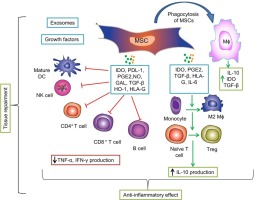European Journal of Cell Biology ( IF 4.5 ) Pub Date : 2019-04-14 , DOI: 10.1016/j.ejcb.2019.04.002 Shobha Regmi , Shiva Pathak , Jong Oh Kim , Chul Soon Yong , Jee-Heon Jeong

|
Mesenchymal stem cells (MSCs) are promising alternative agents for the treatment of inflammatory disorders due to their immunomodulatory functions, and several clinical trials on MSC-based products are currently being conducted. In this review, we discuss recent progress made on the use of MSCs as immunomodulatory agents, developmental challenges posed by MSC-based therapy, and the strategies being used to overcome these challenges. In this context, current understanding of the mechanisms responsible for MSC interactions with the immune system and the molecular responses of MSCs to inflammatory signals are discussed. The immunosuppressive activities of MSCs are initiated by cell-to-cell contact and the release of immuno-regulatory molecules. By doing so, MSCs can inhibit the proliferation and function of T cells, natural killer cells, B cells, and dendritic cells, and can also increase the proliferation of regulatory T cells. However, various problems, such as low transplanted cell viability, poor homing and engraftment into injured tissues, MSC heterogeneity, and lack of adequate information on optimum MSC doses impede clinical applications. On the other hand, it has been shown that the immunomodulatory activities and viabilities of MSCs might be enhanced by 3D-cultured systems, genetic modifications, preconditioning, and targeted-delivery.
中文翻译:

间充质干细胞疗法治疗炎性疾病:挑战,机遇和未来展望
间充质干细胞(MSC)由于具有免疫调节功能,是治疗炎症性疾病的有前途的替代药物,目前正在对基于MSC的产品进行多项临床试验。在这篇综述中,我们讨论了使用MSCs作为免疫调节剂的最新进展,基于MSC的疗法带来的发展挑战以及用于克服这些挑战的策略。在这种情况下,讨论了目前对负责MSC与免疫系统相互作用的机制以及MSC对炎症信号的分子反应的理解。MSC的免疫抑制活性是通过细胞间接触和免疫调节分子的释放而开始的。这样,MSC可以抑制T细胞,自然杀伤细胞,B细胞,以及树突状细胞,还可以增加调节性T细胞的增殖。然而,诸如移植细胞存活力低,归巢和植入受损组织中差,MSC异质性以及缺乏关于最佳MSC剂量的足够信息之类的各种问题阻碍了临床应用。另一方面,已经表明,通过3D培养系统,基因修饰,预处理和靶向递送可以增强MSC的免疫调节活性和活力。











































 京公网安备 11010802027423号
京公网安备 11010802027423号